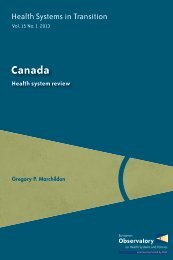Health Systems in Transition - Hungary - World Health Organization ...
Health Systems in Transition - Hungary - World Health Organization ...
Health Systems in Transition - Hungary - World Health Organization ...
Create successful ePaper yourself
Turn your PDF publications into a flip-book with our unique Google optimized e-Paper software.
<strong>Health</strong> systems <strong>in</strong> transition <strong>Hungary</strong> 53<br />
Moreover, the right of choice is given to patients with regard to some of the<br />
medical services f<strong>in</strong>anced by the NHIFA. S<strong>in</strong>ce 1992 people are allowed to<br />
choose a family doctor freely, with the restriction that they may change only<br />
once a year. Family doctors are not allowed to refuse patients who live <strong>in</strong> their<br />
primary care district, but are offered the choice of not accept<strong>in</strong>g applicants from<br />
other districts (1992/3, 1997/9). Similarly, patients can contact specialists from<br />
a variety of discipl<strong>in</strong>es without referral. The patients can choose to be referred<br />
to other health care providers than the providers orig<strong>in</strong>ally assigned for the<br />
treatment, provided that the chosen provider is will<strong>in</strong>g to accept the patient by<br />
stat<strong>in</strong>g this <strong>in</strong> written form. The chosen provider has to accept the patient unless<br />
there is no f<strong>in</strong>anced free capacity, or if the provided care would endanger the<br />
care of the patients who are assigned with<strong>in</strong> the catchment area of the given<br />
provider. Also, patients can request other health professionals to treat them,<br />
but the providers can charge extra fee for this service (1997/9). See sections 5.3<br />
and 5.4 for more details on primary and specialist care.<br />
Co-payments are also due when non-emergency specialist services are<br />
obta<strong>in</strong>ed without referral from an authorized medical doctor, normally the<br />
family doctor; or patients choose to go to a provider other than the one they<br />
were referred to; or, f<strong>in</strong>ally, patients want to receive more services than the<br />
doctor prescribed (1997/9, 1997/18). See subsection Depth of coverage <strong>in</strong> section<br />
3.3.1 for more details.<br />
At health policy level, knowledge is limited on: how patients exercise their<br />
choices; whether the levels of <strong>in</strong>formation facilitate choice; and how the current<br />
level of choice affects equity and efficiency.<br />
2.9.3 Patient rights<br />
The chief significance of Act CLIV of 1997 on <strong>Health</strong> came from its declaration<br />
of patient rights, which had not been previously regulated <strong>in</strong> a comprehensive<br />
manner. The Act also established the <strong>in</strong>stitution of patient rights representatives<br />
and the <strong>in</strong>stitution of arbitration for resolv<strong>in</strong>g disputes between patients and<br />
health care providers (1997/20, 2000/9).<br />
Follow<strong>in</strong>g the Declaration on the Promotion of Patients’ Rights <strong>in</strong> Europe<br />
by WHO <strong>in</strong> 1994, the approved Act CLIV of 1997 on <strong>Health</strong> <strong>in</strong>corporated these<br />
rights extensively, together with the patient’s obligation regard<strong>in</strong>g cooperation<br />
with the providers and respect for the rights of the other patients as well as<br />
the medical professionals. The chapters of the def<strong>in</strong>ed rights frame one of the<br />
core concepts of the law. Some of these rights have been discussed above <strong>in</strong><br />
subsections 2.9.1 and 2.9.2. Partly repeat<strong>in</strong>g them here, the follow<strong>in</strong>g rights were
















